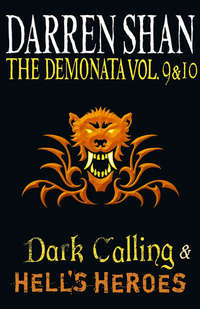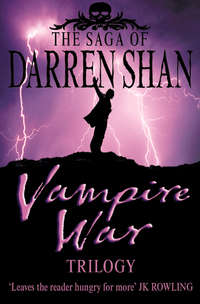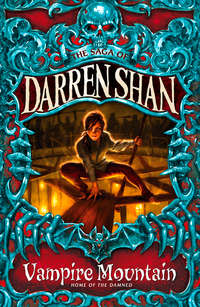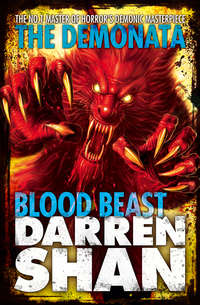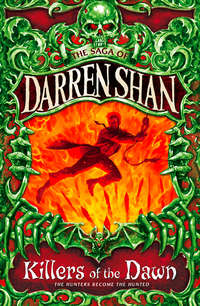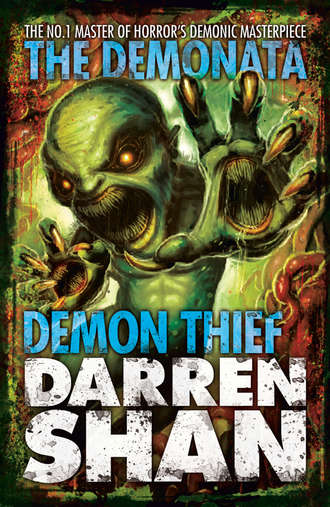
Полная версия
Demon Thief
We’ve been here almost a year. It’s not a bad place to live. Quiet and clean. Lots of open space around the village. No pollution or crime, and people are very relaxed and friendly. A few commute to cities or towns, but most work locally. Quite a few are craftspeople and artists. We don’t get many tourists in Paskinston, but our artisans (as Dad calls them) supply a lot of tourist shops around the country. Musical instruments are the village’s speciality, traditionally carved, lovingly created and packaged, then expensively priced!
Dad’s got a job painting instruments. It doesn’t pay very well, but you don’t need much money in Paskinston. He’s happier than he ever was in the city, finally able to call himself a real artist. Mum helps out kids with learning problems, and does some teaching in the school when one of the regular teachers is off sick. She’s happy too, the happiest I’ve seen her since Annabella died.
Mum and Dad never talk about the time Art and I went missing. It’s a forbidden subject. If I ever bring it up, they change the topic immediately. Once, when I pressed, Mum snapped at me, swore and told me never to mention it again.
And me? Well, I’m OK. Dad was right. The kids here are nicer than in the city. They chat to me at school, include me in their games, invite me to their houses to read and play, take me on day trips into the local countryside at weekends. Nobody bullies me, says nasty things to me or tries to make me feel like I’m a freak. (Of course, it helps that I don’t mention the secret patches of light!)
But I still don’t fit in. I feel out of place. It’s hard to talk freely, to join in, to behave naturally. I always feel as though I’m acting. Most of the kids in Paskinston were born here or moved here when they were very young. This is the only world they know and they believe it’s perfect.
I don’t agree. While I’m certainly happier now than I was in the city, I miss the cinemas and museums. Except for not having any friends, I liked being part of a big city, where there was always something new to see or do. The village is nice, but it’s a bit boring. And although the kids are nicer to me, I still haven’t made any real friends.
But it’s not that important because I’m not miserable any more. I’m not sure why, but I don’t feel lonely these days. I’m happy just to be with Mum, Dad and Art. Especially Art. He might only be a baby, but I love dragging him around with me, explaining the world to him, telling him about books, television and life, trying to teach him to speak. He should have started by now, but so far not a word. Dad and Mum don’t mind. They say Einstein was older than Art is before he spoke. But I don’t think Art’s an Einstein — he likes tugging ears, biting people and burping too much to be a genius!
Art’s all I really need from the world right now. He keeps me company better than any friend ever could. As Dad once said when I was lonely and he was trying to cheer me up, “Who needs friends when you have family?”
→ To get to school, I have to pass the witch’s house.
The “witch” is Mrs Egin. There are thirty-seven families and six single people in Paskinston, and everyone’s on friendly terms with everybody else. There’s a real sense of community. They all take an interest in and see a lot of each other, chat among themselves when they meet in the street or at church, hold big parties every few months to which everyone comes.
Except Mrs Egin. She lives by herself in a dirty old house and almost never has anything to say to anybody. She comes out for a long walk every day and to draw water from the well. (There’s running water in Paskinston, but Mrs Egin and a few others prefer to get theirs from an old well in the centre of the village.) But otherwise we rarely see her. She spends most of her time indoors, behind thick curtains, doing whatever it is that witches do.
I’m sure she’s not really a witch, but all the kids call her the Pricklish Witch of Paskinston. Some of the adults do too!
There isn’t a real school in Paskinston, just a converted stable which is being used as a school until the villagers manage to build a proper one. There are three teachers (two are volunteers), crappy old desks, wobbly chairs, a few tired blackboards, and nothing else except the ancient toilets out the back. A big change from my school in the city!
The school’s down the street and round the corner to the left from where we live. To get there, I have to walk past Mrs Egin’s house. I could go the opposite way and circle round the backs of the houses if I wanted. But Mrs Egin has never done anything bad to me. She hasn’t even spoken to me in the year that I’ve lived here. She doesn’t frighten me.
Today, I set off for school as normal. Classes start at 9:30 a.m. but I normally get there for 9 o’clock, to play some games with the other kids beforehand. Trying hard to fit in, to be like they are, to have them accept me. Not that I’m too bothered if they don’t.
“Off to school?” Mum asks as I’m heading out.
“Yes.”
“Want to take Art to the crèche?”
“Sure.”
The makeshift crèche is in another converted stable, right next to the school. I often drop Art off.
Art’s small and skinny. A large head though. Dad says that’s a sign that he has lots of brains, but I think it’s because he has a thick skull — all the better for headbutting!
I stop Art trying to bite the hands off a soldier doll and pick him up. He struggles, eager to finish off the soldier. “Stop,” I grunt. Art calms down immediately. He always does what I tell him. He’s more obedient for me than for Mum or Dad. Mum says that’s a sign that he really loves me. It makes me proud when she says stuff like that, though I usually scowl — don’t want her thinking I’m soft.
Art’s pale, like Mum, with dirty dark hair that looks like it’s never been washed. Mum always complains about Art’s hair. She regularly threatens to shave him bald like me. (Not that I need to shave — I’ve been bald since birth.) She says every guy should be bald — it makes life much simpler for the women looking after them.
I throw Art up in the air and catch him. He laughs and gurgles for me to do it again. I compare my skin to his as I toss him up a second time. I’m much darker, a nice creamy brown, more Dad’s colour than Mum’s. We don’t look like brothers. Mum says that’s good — people won’t confuse us when we’re older.
I settle Art down and head for the door, carrying him under one arm like a skateboard. He swings his fists around, looking for something to hit. He almost never hits or bites me, but I’m the only one who’s safe around him. He’s given Mum a black eye a few times and bit one of Dad’s fingernails off once. He’ll be a real terror when he’s a couple of years older.
We set off down the street. There’s nobody else around. A quiet spring day. Birds are twittering in the trees. A cow moos in the distance. I feel warm and happy. Looking forward to summer. Dad said we might go to the beach for a week or two. We haven’t been on a holiday since we left the city. I’m excited about it.
“You’ve never seen a beach, have you?” I say to Art. “It’s great. More sand than you could imagine. Salt water, not like the ponds here. Seaweed. We can swim and make sandcastles. Eat ice cream and candyfloss. You’ll love it. And if we can’t go, well, we’ll camp round here instead. Find a lake, maybe near a small town, with a cinema and amusement arcades and–”
“Thief!” someone screeches.
We’ve just passed the witch’s house. I look back. The front door’s open. Mrs Egin is standing on the doorstep. Her eyes are wild and she’s trembling. Her hair’s normally tied in a ponytail, but today it’s hanging loose, strands blowing across her face in the light breeze.
“Who’s the thief?” she mutters, staggering towards me.
“Mrs Egin? Are you all right? Do you want me to fetch help?” I set Art down to my left and step in front of him, shielding him with my legs, in case she falls on top of him.
Mrs Egin stops less than a foot away. She’s mumbling to herself, strange words, no language that I know. Her lips are bleeding — she’s bitten through them in several places. Her fingers are wriggling like ten angry snakes.
“Mrs Egin?” I say softly, heart racing.
“Such a beautiful baby,” the witch says, eyes fixed on Art. He’s staring up at her silently. Mrs Egin bends and reaches for Art, cooing, smiling crookedly.
“Leave him alone,” I gasp, shuffling Art back with my left foot, standing firmly in front of him now, blocking her way.
“Not yours!” she snarls, glaring at me. I’ve never seen an adult look at me that way, with total hate. It scares me. I feel like I have to pee. Clench my legs together so I don’t have an accident.
But, scared as I am, I don’t move. I stand my ground. I have to protect Art.
“Are you ill, Mrs Egin?” I ask, my voice a lot calmer than I feel.
“Find him!” she shouts in reply. “Find the thief! Beautiful baby.” She smiles at Art again, then mumbles to herself, like a minute ago, but gesturing at Art this time, as though she’s casting a spell on him.
I look for help but we’re all alone. I can’t just stand here and let this go on. No telling what she’ll do next. So, without taking my eyes off her, I stoop, grab Art and awkwardly hold him up behind my back. Art squeals happily — he thinks I’m giving him a piggyback ride.
“We have to go now,” I say, edging away. Mrs Egin’s still looking at the spot where Art was. I notice that lots of the patches of light around us are pulsing. They’re closer than they normally are, as if hedging us in. But I can’t worry about the lights. Not with Mrs Egin acting like a real, mad witch.
“Soon!” Mrs Egin barks and her eyes snap upwards. “All be happening soon. They thought I didn’t have it in me. Said I was weak. But they were wrong. I have the power. I can serve.” Her hands go still. Her eyes soften. “You will see me die,” she says quietly.
Tears of confusion and fear come to my eyes. “Mrs Egin, I… I’ll fetch help… I’ll get someone who can–”
“Thief!” she yells, silencing me, wild and twisted again. Her hands come up and wave angrily at me. “Find the thief! Soon! You’ll see. The mad old witch going up in a puff of smoke. Boom, Kernel Fleck. Boom!”
She laughs hysterically. When you hear a witch laugh in a movie, it’s funny. But this isn’t. The laughter hurts my ears, makes them ring from deep inside. I half expect them to start bleeding.
“I have to go now,” I say quickly, turning away from her, sliding Art round so he’s in front of me, all the time protecting him from her.
“Kernel,” the witch says in a cold, commanding tone. Reluctantly, I stop and look back. “You won’t tell anyone what you’ve seen today.” It’s not a question.
“Mrs Egin… you need help… I think…”
She spits on the ground by her right foot. “You’re a fool. I’m not the one who needs help — you are. But never mind that. You won’t tell anyone. Because if you do, I’ll creep into your room late at night when you’re asleep and slit your throat from your left ear to your right.” She uses a trembling index finger to illustrate.
That’s too much. I lose control and, to my shame, feel the front of my trousers go wet. Fortunately Mrs Egin doesn’t see. She’s already turned away. Walks back to her house. Pauses at the front door. Looks up. There’s a six-sided patch of pink light pulsing rapidly just above her head. She reaches up and strokes it. The pulse rate slows, as if the light was afraid and she has calmed it down.
“Thought you were the only one who could see them,” she says as I stare at her in shock. “But I can too. Now. For a while. Until they take me.”
Then she goes inside and shuts the door.
For a long moment I stand, fighting back tears, ears still ringing, wanting to run away and never return. But I can’t do that, and I can’t turn up at school with wet, stained trousers. So I hurry home, clutching Art tight to my chest, steering as far wide of the witch’s house as I can.
MARBLES
→ I lie to Mum. Tell her Art peed on me. She’s surprised — he’s never been a wetter. She wants to change him. I tell her it’s all right, I’ll take care of it. I hurry to my bedroom and change my trousers. I’m almost out the door before I remember that Art should be changed too, so I quickly find clean clothes for him.
I consider telling Mum about Mrs Egin’s behaviour. Recall her threat — “slit your throat from your left ear to your right.” Don’t say a word.
→ The day passes uncomfortably. I can’t forget what Mrs Egin said, her wicked expression, stroking the pulsing patch of light. “You will see me die.”
I should tell someone. It doesn’t matter that she threatened me. She won’t be able to sneak into my room if I tell someone and they lock her up like the mad old witch she is.
But I wet my trousers. If I tell about the rest, I’ll have to tell about that too. And I don’t want people knowing. So I say nothing. I pretend it didn’t happen, that it doesn’t matter. And all day long I feel as if a thousand eels of terror are wriggling around inside me.
→ Dad’s talking with Mum about a craft fair when I come home. She’s listening quietly, sitting by the piano. (It was in the house when we moved in — none of us can play.) She’s frowning.
“This is one of the biggest fairs in the country,” Dad says. “It’s held every year, and a few of the Paskinston artists always go, representing the village. They sell a lot of work at it and rack up loads of orders. It’s a real honour to be asked. It would be rude to refuse.”
“But can’t one of us go and one stay here?” Mum asks.
“Yes, but couples normally go together. It’s not just about selling. There are hundreds of artists and interesting people there. It’s a chance to meet, mingle, get to know other people. It’ll be fun.”
I hand Art to Mum and sit close to her, following the conversation. I learn a bit more about the fair, where it’s held, who’s going, how long they’ll be gone for. Dad’s proud to have been invited and keen to go, but Mum’s worried about Art and me. She doesn’t want to leave us alone. “Can’t we take them along?” she asks.
“It’s not the done thing,” Dad says patiently. “Nobody else brings their kids.”
Mum’s frown deepens. We haven’t been apart since we left the city, not for a single night. But if they go to the fair, they’ll be gone for at least a week.
“They won’t be by themselves,” Dad says. “We’ll leave them with one of the neighbours.”
“I know, but…”
“Kernel doesn’t mind. Do you, Kernel?” He smiles broadly at me, expecting my support. If this was yesterday, I’d have given it instantly. But Mrs Egin’s threat is fresh in my thoughts. I don’t want to be left alone. So I just shrug in answer. “You OK, big guy?” Dad asks, surprised.
“Yeah.”
“If you don’t want us to go, just say. It’s not that important.”
“No. I mean, I don’t mind. Not really. It’s just…” I can’t explain without telling them the truth. So again I shrug.
“What about Art?” Mum says, kissing his head, looking up at Dad.
“Art will be fine too,” Dad says and he sounds a little impatient now.
“I’m not sure, Caspian.”
“Melena…” Dad sighs. “Look, if it’s going to be a big deal, we won’t go. But this is our home now. We’re safe here. I don’t think we’ve anything to fear in this place. Do you?”
“No,” Mum says quietly.
“So…?”
Mum pulls a face. “I just don’t like being apart from my darling babies!” she exclaims. We all laugh at that, and everything’s fine again. Mum bounces Art up and down on her knee. Dad smiles and hugs her. I feel happy and safe. I ask what’s for dinner, and forget about the witch and all the bad thoughts of the day.
→ The morning of their departure. Dad gets the car ready while Mum takes Art and me over to Sally’s house. Sally is one of the villagers who lives alone. A bit older than Mum. Fat. A great singer. She has two children of her own, but they’ve grown up and left.
“We’re going to have a great time,” Sally says as we set our bags down in the room where Art and I are staying.
“I wish there was a phone, so we could call and check that everything is all right,” Mum grumbles. There aren’t many phones in the village and Sally doesn’t own one.
“Relax!” Sally laughs. “These boys can get along fine without you for a few days. Can’t you, Kernel?”
“Sure,” I smile. Mum smiles back, but shakily.
Dad calls us and we head out. He’s standing by the car. The back seat and boot are filled with musical instruments and paintings. Two other couples have already left in a caravan with the majority of the pieces which they hope to sell. Dad hugs Art, then me.
“Look after your brother,” Mum says, kissing my cheek.
“Of course he will,” Dad says. “Kernel’s the best brother in the world. He’ll take care of Art better than you or I could.”
Dad gets in and starts the engine. Mum hugs us one last time, then sits in beside him. And they’re off. Art, Sally and I wave after them. Mum rolls down her window, leans out and waves back, until they turn a corner. Although Sally’s right beside us, I can’t help but think as they roll out of sight — we’re alone now. Just Art and me. In a remote village. With a witch.
→ The day passes smoothly. School, playing with Art during lunch, dinner with Sally and some others. The villagers like to share meals. Here it’s not polite to eat by yourself all the time. We often have guests over to eat with us, or go to a neighbour’s house.
Art doesn’t miss Mum and Dad. He eats, drinks, plays and behaves the same as always. Doesn’t cry when Sally gives him a bath. He does give her a sharp nip on her left forearm at one stage, leaving deep marks, but that’s normal for Art.
“We should stitch his lips together when he’s not eating,” Sally says, rubbing her arm. But she’s only joking. Sally loves kids. Of course, she’d rather not be bitten, but the whole village knows about Art’s biting habits. Sally knew what she was letting herself in for when she offered to have us.
It’s strange not having Mum and Dad around. Things were different when we lived in the city. They often went out at night, leaving me with a babysitter. And they’d go for holidays by themselves occasionally. I didn’t mind. I enjoyed staying with other people — I always got loads of treats.
But for the last year we’ve been together all the time. I’ve got used to them being at home every night. I feel like I did when I lost my favourite teddy bear a few years ago. It was a scruffy grey bear, nothing special, but I’d had it since I was a baby. It had been my constant companion, even when I’d outgrown my other teddies. I took it to bed, on holiday, even to the cinema. I felt like a friend had died when I lost it.
This is almost the same. Not as bad because I know Mum and Dad will come back. But strange. Like something’s wrong with the world.
→ I’m uneasy when it’s time for bed. Sally’s spare bed is soft, but it smells damp, like my socks when they’re wet. Art goes to sleep immediately, delighted to be sharing a bed with me. But I can’t drop off. I’m tired – I woke early, knowing Mum and Dad were leaving – but my eyelids won’t stay closed.
I think about Mrs Egin. I haven’t seen her since that morning when she witched out on me. I’ve taken the long way to school and back every day since. I’ve tried to laugh it off, make like it was no big deal. Told myself I imagined the curses and her stroking the patch of light.
But I know what I saw. I can’t pretend it didn’t happen. And although I’m not as scared as I was that first night, I’m still shaken, afraid to close my eyes in case she’s there when I open them, standing over me, cackling, a knife to my throat.
I turn from my left side to my right, then back again. I try lying flat on my back, then on my stomach. Nothing works.
Annoyed, I stop trying to sleep, hoping I’ll drift off by accident. I look round the small, cosy room, then focus on the patches of light. They look the same as ever, various shapes and shades. I count triangles, quadrangles, pentagons, sextants… No, that’s an instrument. Sextuplet? I’m not sure. I think that’s right, but I’m not… maybe it’s a…
→ I wake suddenly. Hexagon! Of course. Can’t believe I had trouble remembering that. The brain can play funny tricks when you’re tired. I turn, yawning, looking for Art.
He isn’t there.
At first, I think he’s just slipped further down beneath the covers, but when I lift them there’s no sign of him.
I sit up swiftly, sensing danger, recalling Mum’s last words to me — “Look after your brother.” Flash on an image of Mrs Egin sneaking in, stealing Art, putting him in a big black pot and boiling him alive.
My world is never truly dark. The patches of light mean I can see pretty well even on the blackest night. Mum and Dad used to try to convince me that the lights weren’t real, but if they’re imaginary, why do I have such fantastic night vision?
I get out of bed and hurry to the door, so certain Art isn’t in the room that my gaze glides right over him and I almost crash into him. Then my senses click in and I stop. Blink a couple of times to properly clear my eyes.
Art’s in the middle of the room. There’s a large patch of orange light pulsing just over his head. He’s playing with marbles which Sally gave to me earlier. He’s holding two of them up over his eyes. They’re orange-coloured, like the light.
Art sees me and smiles, looking at me through the orange marbles. For a brief second I’m positive that somebody or something is in the room with us. I think I hear a soft growling noise. My head snaps left, then right — nothing. I look back at Art. In the strange orange light, with the marbles covering his eyes, he doesn’t look like my brother. I start to think that it’s not Art, that he’s been replaced by some evil spirit, that the witch has been here. I feel afraid. I back up to the bed.
“Art?” I say, very softly. “Is that you? Are you OK?”
A giggle breaks the spell. Art lowers the marbles. And I see that of course it’s him.
“Idiot!” I laugh weakly at myself. I go pick Art up and take the marbles away. Sally said not to let him have them in case he swallowed one. Art grumbles and tries to grab them back, but I tell him they’re dangerous. He understands that and snuggles into me, nuzzling my shoulder with his teeth, but gently, not like when he bites somebody.
I stand there with Art, feeling cold but happy, smiling at how silly I was. Art falls asleep in my arms. I carry him back to bed, tuck him in, then climb in beside him. Lying on my side, I stare at the orange light, still pulsing. It seems to have grown bigger, but that’s not unusual — the patches often change size.
I don’t like this orange light. There’s something creepy about it. It reminds me of the pink light which Mrs Egin stroked. I turn my back on it and shut my eyes tight, trying to fall asleep again. But I can still sense it there, hanging in the cold night air, lighting up the room with its ominous orange glow. Pulsing.
DING DONG
→ Two days later. The orange light is still pulsing and changing size. Although I can call it closer like the other patches, I can’t send it away more than twenty or twenty-five feet. It’s started to bug me, like an insect which keeps buzzing in front of my face. An uneasiness chews away at me every time I catch sight of it. I know it’s crazy, worrying about a light, but I can’t help myself. I have a bad feeling about this.
→ It’s a lovely sunny day. Our teacher, Logan Rile, decided not to waste the weather, so we’re having lessons outside, in one of the fields around Paskinston. There are thirty-four of us, a variety of classes and ages, sitting in a semi-circle around Logan. He’s telling us about tectonic plates. Logan’s not the best teacher. He sometimes forgets he’s talking to children and gets too technical. Very few of us understand everything he says. But he’s interesting, and the bits that make sense are fascinating. It’s also fun when you do understand him — it makes you feel clever.




